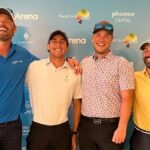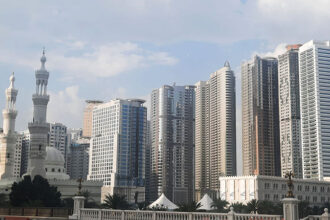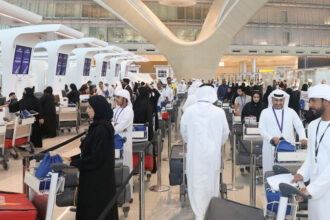A branch of Credit Suisse in Geneva. – AFP
The distress in the global banking sector could result in some Gulf banks taking stakes in the distressed lenders in the West, a new report has suggested.
“GCC-based investment firms are uniquely positioned to take advantage of the distress that multi-national firms are experiencing which has probably taken their value lower than their fair value,” a report by Forex.com said on Monday.
Previously, many GCC firms had taken advantage of undervalued assets during the global financial crisis in 2008, when Abu Dhabi and Qatar-based investment funds invested $12.1 billion in undervalued Barclays Bank stocks, together owning almost 30 per cent of stocks. According to Reuters, the Abu Dhabi investment firm exited the investment 5 years later for a $ 2.5 billion profit, followed by its Qatari counterpart in 2012, which had made $2.7 billion in profits.
“Accordingly, there is a high chance for sovereign and semi-sovereign investment funds in the GCC region to seriously consider investing in global banking assets which are currently in distress, in need of cash and, most likely, undervalued. Backed by oil-generated cash, GCC investors have the means and experience to take advantage of such situations, turning a potentially globalized crisis into their advantage,” the report said.
Analysts note that the biggest risk resulting from the collapse of three US banks is the “fever of withdrawing deposits from banks” resulting from depositors losing faith in the banking sector and seeking to save their deposits, similarly to what happened with Signature Bank.
Several Middle Eastern stock indexes fell slightly last week. “The ever-changing outlook of the global banking sector is creating a climate of uncertainty, which is leading investors to take a risk-off approach to capital allocation. Whenever that happens, outflows from equity funds, especially from emerging markets, are observed,” the report said.
Adding to the pressure are the tight financial conditions that resulted from friction in the interbank lending market. Banks have been seeking liquidity from each other and from central banks, and as such liquidity is being called in, investments or trading positions are being liquidated, starting with those exposed to emerging market equities as they are considered riskier.
Globally, analysts feel that the Silicon Valley Bank (SVB) crisis is most likely to drive regulators around the world to put more regulations and oversight on the composition of banks’ balance sheets to make sure that such duration mismatch is not as severe as it was for SVB.
Following the SVB collapse, everyone started comparing the current banking situation in the United States with the one the country had faced back in 2008. However, according to senior Forex.com analysts, there is a big difference between the two, and this difference may just be the reason why the current financial and banking situation in the US may not result in a globalized financial crisis that affects the Mena region.
In 2008, banks and financial institutions held sub-prime assets that represented a credit quality risk. Back then, careless management was to blame. In contrast, the current banking crisis was not caused by carelessness, but rather by duration of maturity risk, the analysts note.
A run on the bank can cripple any bank, not just SVB. Technically, the latter didn’t do anything wrong; it was just a victim of an interest rate that went from zero to over 4 percent in almost a blink, reaching the highest rate ever to be recorded in the history of the US banking industry.
Since the global financial crisis central banks have raised the deposit insurance in the case of the US from $100,000 per account to $250,000. Furthermore, when the SVB crisis hit, the Federal Reserve stepped in to guarantee the entirety of deposits, not just those within the FDIC $250,000 insurance, which is unprecedented in the history of American banking.
In the UAE, the Central Bank had guaranteed all bank deposits following the 2008 crisis, reassuring depositors of the strength and stability of the Emirati banking system, and preventing a bank run. This has earned the UAE the reputation of regional financial and banking hub ever since, as no bank in the Emirates had suffered the fate of Lehman or SVB. Most recently, it was reported that deposits in the 18 publicly-traded UAE banks have increased by 32 per cent or Dh315 billion in 2022, with total assets expected to reach almost Dh3.5 trillion by the end of 2022.
According to FOREX.com strategic analysts, and based on the above, UAE Banks could be among the safest banks in the world today. Well-capitalized and backed by a capable central bank, they are well-shielded from the current US banking crisis, with chances of facing a bank run being highly unlikely, especially following the 2008 UAE Central Bank’s move which comforted depositors.
Read the full article here















